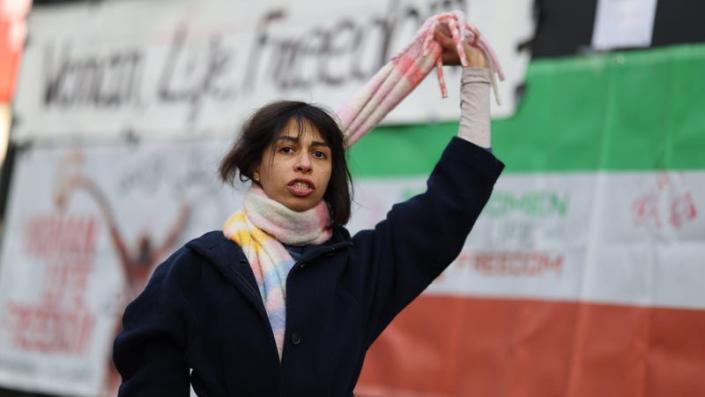Xi Warns China Officials to Avoid ‘Collusion’ With Big Business

Mon, January 9, 2023
(Bloomberg) -- Chinese leader Xi Jinping warned officials against colluding with the business world, underscoring that his government’s crackdown on the private sector will remain a concern for investors despite efforts to boost the economy.
“Action should be taken to prevent leading officials from acting for any interest group or power group, and to forestall any collusion between officials and businesspeople,” Xi told a meeting of anti-corruption regulators on Monday, according to the official Xinhua News Agency.
He also warned against “any infiltration of capital into politics that undermines the political ecosystem or the environment for economic development.”
Xi’s government has recently eased up on a regulatory crackdown on tech giants like Alibaba Group Holding Ltd. and Tencent Holdings Ltd., helping their shares rebound. Yet questions remain over how far that approach will go given Xi has also pledged to ensure “common prosperity,” in part by reining in wealthy special interests.
Xi has made reining in graft a central aspect of his leadership of the world’s second-biggest economy over the past decade. That approach has been popular with the public and also served to weed out potential threats to his rule.
Last year, the anti-corruption officials broke up what they called a “political clique” led by former police official Sun Lijun, who was sentenced to what amounts to life in prison for taking bribes and other crimes.
The message that graft cannot be allowed to thrive in the Chinese political system is one that Xi delivers regularly. In December, just after securing a third term in power, Xi said the country had achieved an “overwhelming victory” in its battle against corruption but added that the work was “far from over.”
Economic Measures
Xi’s latest call to continue with the campaign comes as his government abandons its Covid Zero approach toward the coronavirus. On Sunday, China opened borders that had been largely closed for nearly three years, after earlier doing away with quarantine camps, mass testing and snap lockdowns.
Those policies had led to public anger, with widespread protests erupting in late November, though the government has insisted its policy changes were underway before the demonstrations erupted.
With covid rules loosening, the government is stepping up efforts to bolster the economy. China is considering a record quota for local government bonds and widening the budget deficit. The economy is forecast to expand by 4.8% this year, compared with little growth in the US and a potential contraction in the Eurozone, according to data compiled by Bloomberg.

Mon, January 9, 2023
(Bloomberg) -- Chinese leader Xi Jinping warned officials against colluding with the business world, underscoring that his government’s crackdown on the private sector will remain a concern for investors despite efforts to boost the economy.
“Action should be taken to prevent leading officials from acting for any interest group or power group, and to forestall any collusion between officials and businesspeople,” Xi told a meeting of anti-corruption regulators on Monday, according to the official Xinhua News Agency.
He also warned against “any infiltration of capital into politics that undermines the political ecosystem or the environment for economic development.”
Xi’s government has recently eased up on a regulatory crackdown on tech giants like Alibaba Group Holding Ltd. and Tencent Holdings Ltd., helping their shares rebound. Yet questions remain over how far that approach will go given Xi has also pledged to ensure “common prosperity,” in part by reining in wealthy special interests.
Xi has made reining in graft a central aspect of his leadership of the world’s second-biggest economy over the past decade. That approach has been popular with the public and also served to weed out potential threats to his rule.
Last year, the anti-corruption officials broke up what they called a “political clique” led by former police official Sun Lijun, who was sentenced to what amounts to life in prison for taking bribes and other crimes.
The message that graft cannot be allowed to thrive in the Chinese political system is one that Xi delivers regularly. In December, just after securing a third term in power, Xi said the country had achieved an “overwhelming victory” in its battle against corruption but added that the work was “far from over.”
Economic Measures
Xi’s latest call to continue with the campaign comes as his government abandons its Covid Zero approach toward the coronavirus. On Sunday, China opened borders that had been largely closed for nearly three years, after earlier doing away with quarantine camps, mass testing and snap lockdowns.
Those policies had led to public anger, with widespread protests erupting in late November, though the government has insisted its policy changes were underway before the demonstrations erupted.
With covid rules loosening, the government is stepping up efforts to bolster the economy. China is considering a record quota for local government bonds and widening the budget deficit. The economy is forecast to expand by 4.8% this year, compared with little growth in the US and a potential contraction in the Eurozone, according to data compiled by Bloomberg.






.jpeg)









